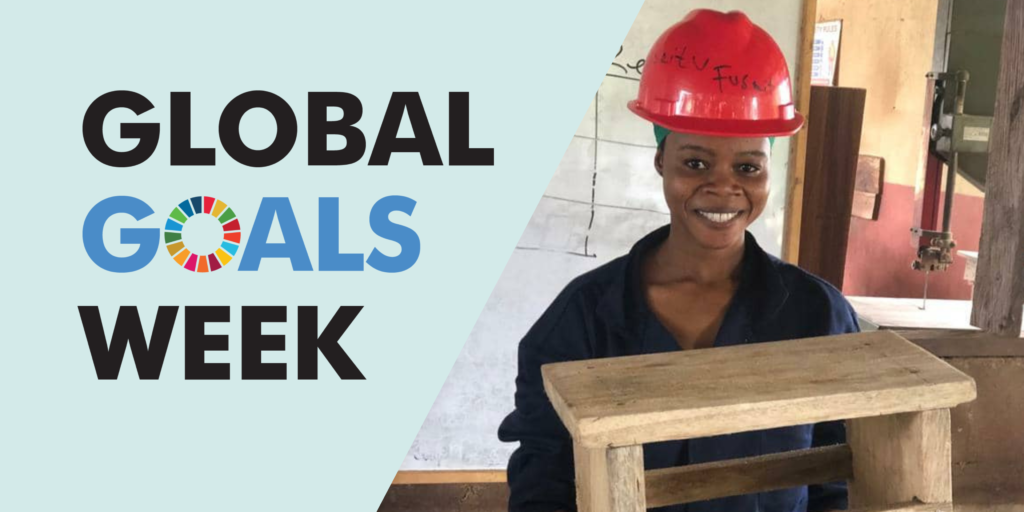
By: Humu-Hani Adam, Gender Equality Promotion Coordinator, WEE-NORTH Project, Ghana
Global Goals week is an opportunity to reassert our commitment to fulfilling the Sustainable Development Goals to build a more sustainable future. One of the projects helping Alinea to move toward achieving those goals is WEE-NORTH
The WEE-North project is a five-year project funded by Global Affairs Canada and Implemented by Alinea International in Northern Ghana. The project works with families, technical training institutions, and industries to have young women from remote and underserved communities break gendered stereotypes by introducing them to trades such as bricklaying, electrical installation, plumbing, carpentry, welding, and small engine repair. The project seeks to train 2,000 young women from age 18-35 in these male-dominated, industrial trades.
WEE-North is the first project in Northern Ghana to provide a comprehensive program in industrial trades training to young women. It involves practical competency-based training, soft skills and empowerment sessions, counselling, and workplace experience learning. After they have completed the training program, all graduates join the WEE-Group in their district to benefit from mentorship to start their businesses, along with additional training, savings and loans, and social support.
 By the end of 2022, we will have trained 850 young women from all 55 districts in the five regions of Northern Ghana. They will bring much-needed skills into their communities, some of which do not have skilled tradespersons. Women will also have a source of income through valued and decent work.
By the end of 2022, we will have trained 850 young women from all 55 districts in the five regions of Northern Ghana. They will bring much-needed skills into their communities, some of which do not have skilled tradespersons. Women will also have a source of income through valued and decent work.
One of our graduates, Fatima, says, “During my married life, I never earned a Cedi ($0.20 CAD) and was totally dependent on my husband. Now, as a bricklayer, I earn 40 cedis ($8.00 CAD) a day which helps me take care of my family and save for the future.”
Udeida, another graduate and mother of three children, says that her life has changed through WEE-North: “Before I joined the project, we used to fetch water from a community borehole (well). After my WEE-North training at Dabokpa Technical Institute in Tamale, I had my workplace experience with the Ghana Water Company. With my training and hard work, I’ve been able to install a tap in my house, so I don’t have to fetch water at the well anymore. People contact me to fix their pipes on a regular basis and I even have a new job as an assistant plumbing instructor at the technical institute where I trained. My community celebrates my new skills and respects me because I am the first woman plumber they have known.”
Fishetu is from a remote community and tells of a dramatic transformation in her life. She is from Mamprugu-Mougduri in Northeast Region, a district which is called “overseas” because it is flooded and cut off from the rest of the region six months per year. Fishetu was involved in a sports accident, that now affects the way she walks. After completing high school seven years ago, she moved to the big city of Kumasi far away from her home to become a head porter in the largest market in West Africa. Because of her limp, she didn’t get much work. Instead, she was exploited and abused, and couldn’t even make enough money to go back home. In June, Fishetu heard about the WEE-North project from a friend back home and she quickly called the hot-line. Because of her special circumstances, WEE-North provided transportation for Fishetu to travel from Kumasi to Tamale. She is currently studying carpentry and woodwork at Tahamayili Technical and Vocation Institute, one of WEE-North’s residential training sites, where she is well cared for during the training program. When she graduates, she will be the first woman carpenter to offer woodworking services in her district. She encourages her friends to come home and learn a trade.
“I want to say a big thank you to WEE-North, Alinea and Global Affairs Canada for this life-changing opportunity to become empowered and skilled.”
There are many young women in Northern Ghana like Fatima, Ubeida and Fishetu who are working hard to change the face of industrial trades in Northern Ghana by breaking stereotypes and achieving greatness through the WEE-North Project
